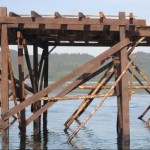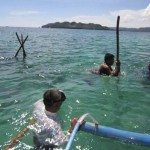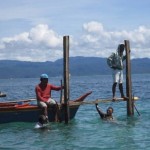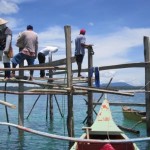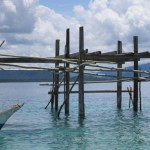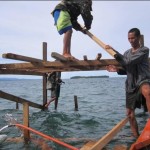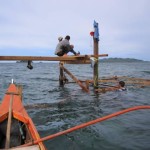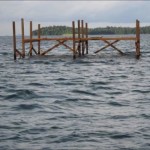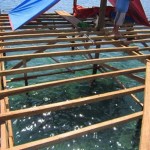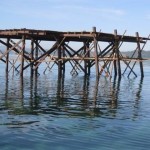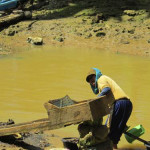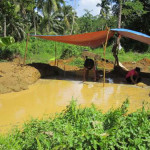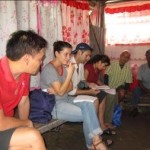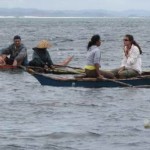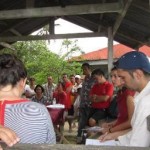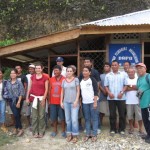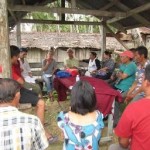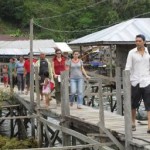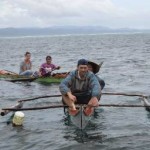Author Archives: pdap
PDAP starts pre-deployment of PBSP business advisers for SEAWEED Project share
As part of the SEAWEED Project, volunteer business advisers from the Philippine Business for Social Progress (PBSP) were pre-deployed last February 20-27, 2013 to conduct site assessment and meet with PDAP partner POs in Surigao del Sur and Surigao del Norte. The advisers discussed with the POs the scope and approaches of the business advisory program. The advisers will be deployed for the next 12 months to provide capacity building through coaching/mentoring to improve the POs organizational and enterprise performance.
The shift in the manner of providing capacity building intervention was a result of the performance capacity index (PCI) assessment last July 2012 and recognition that though the POs are mostly at the start-up stage, they do have different needs. By engaging the expertise of PBSP in business advising, participating POs will be provided with learning experience which will help in addressing their organizational and enterprise development needs.
Siltation Affects Seaweed Farmers in Surigao del Sur share
Cropping season for seaweeds in Surigao del Sur was cut short in the first quarter due to soil siltation caused by illegal small-scale mining activities in the coastal barangays of Barobo and Lianga. These small-scale mining activities employ soil flushing wherein miners use water pumps to flush gold from the soil resulting in siltation. Soil sediments are then carried by waste water to the coastal areas causing growth stagnation and eventual decay of seaweed plants. In effect, seaweeds production in the area declined.
Seaweed farmers in Surigao del Sur specifically those in Liatimco in the Municipality of Lianga and in some barangays of Barobo were greatly affected. Based on the assessment made by PDAP and the local government unit, estimated damage reached Php679,000 affecting 78 seaweed farmers from six (6) of the PDAP PO partners. Because of this, farmers stopped planting seaweeds and instead tried other means of livelihood like fish peddling and gold panning as well as to apply as skilled workers.
In response, the PDAP Seaweed Project Technical Working Group (TWG) submitted a resolution/position paper to the local government units (LGUs) of Lianga and Barobo. It urges the LGUs to immediately stop flushing along the coastal areas or areas that channel waste to the bay and the immediate relocation of the small scale mining operations to areas where waste water could no longer affect Lianga Bay. The same resolution/position paper was submitted to NEDA on May 22, 2013 and was subsequently endorsed to the Regional Development Council Economic Development Committee (RDC-EDC).
The RDC-EDC technical working group met last June 4, 2013 at the NEDA Conference Hall in Butuan City to discuss and address the issue. The group came up with recommendations which were submitted for consideration in the RDC-EDC Full Council Meeting held last June 20, 2013 at the Provincial Governor’s Office, Provincial Capitol, Tandag City. In the full council meeting, an RDC-EDC resolution was passed enjoining all LGUs and mining companies to adopt filtering technology (i.e. bio-logs to address heavy siltation of rivers and creeks brought about by mining activities). Also, Provincial Governor Johnny Pimentel informed the committee that a cease and desist order to stop all illegal mining activities has been issued. PO representatives were tasked to monitor its enforcement and provide feedback to the office of the Mayor of Barobo.
CODESPA-Madrid Representatives and new Country Manager Visit SEAWEED Project share
Ms. Ines Vasquez and Ms. Beatriz Martin, outgoing and incoming Philippine Operations Head of CODESPA in Madrid, respectively, along with Mr. Angel Gomez, new CODESPA Country Manager for the Philippines, recently visited the SEAWEED Project sites in Lianga and Barobo, Surigao del Sur. They were joined by PDAP Executive Director Gil T. Salazar and Programs Manager Restie Male. The group held separate focused group discussions with the members of PDAP PO partners, namely; Kaliwatan sa EsCon ng mga Mag-uuma ng Mangingisda Kahugpungan alang sa Kalambuan (KEMMAKK), Kinayan Community Based resource Management People’s Organization (KCBRMPO) and Dapdap Fishermen Organization (DAFO). They also made an ocular inspection of the seaweed nursery of KEMMAKK.
The CODESPA visit included a workshop attended by the CODESPA and PDAP representatives to craft the project plan of action for the remaining nine (9) months of project implementation.
PDAP implements Seaweed and Fish Processing Project in Western Samar share
The Partnership for Development Assistance in the Philippines (PDAP) in partnership with Assisi Development Foundation Inc. (ADFI) through Tabang Visayas1 is currently implementing a Seaweed and Fish Processing Project for the rural households in Typhoon Yolanda-affected areas in Western Samar. The one-year project aims to accelerate the economic recovery of the targeted fisher folk-households in the municipalities of Basey and Marabut through the a) provision of seaweeds and bangus/fish processing inputs; b) conduct of capacity building interventions; and, c) establishing market access.
A total of 58 seaweed farmers (38 in Marabut and 20 in Basey) and 60 fisherfolk’s housewives engaged in fish processing (30 in Marabut and 30 in Basey) were targeted as main beneficiaries of the project. However, through the US$1,100 donation to PDAP from two US individuals through the First Church of Christ Scientist Manila, six (6) seaweed farmers from Marabut were added as project beneficiaries.
Production inputs such as ropes, nylons, soft tie, styro foam floater-marker and floaters have been purchased and distributed to the beneficiaries. Trainings on new seaweed farming technology have also been conducted. Through these trainings, farmers were introduced to the best practices in terms of proper line spacing, propagule (seedlings) spacing, floater spacing and aging. Individual coaching and mentoring during actual planting were also conducted to further emphasize how these best practices should be applied.
Coaching on farm management and identification of different kinds of algae and diseases are on-going. Farmers are also being organized into groups and are being oriented on internal savings mobilization. This mechanism will help farmers make financial resources available for themselves partly to sustain their seaweeds farming and provide for emergency needs. The construction of seaweed nurseries and dryers as well as the launch of fish processing activities will be done in the coming months.

